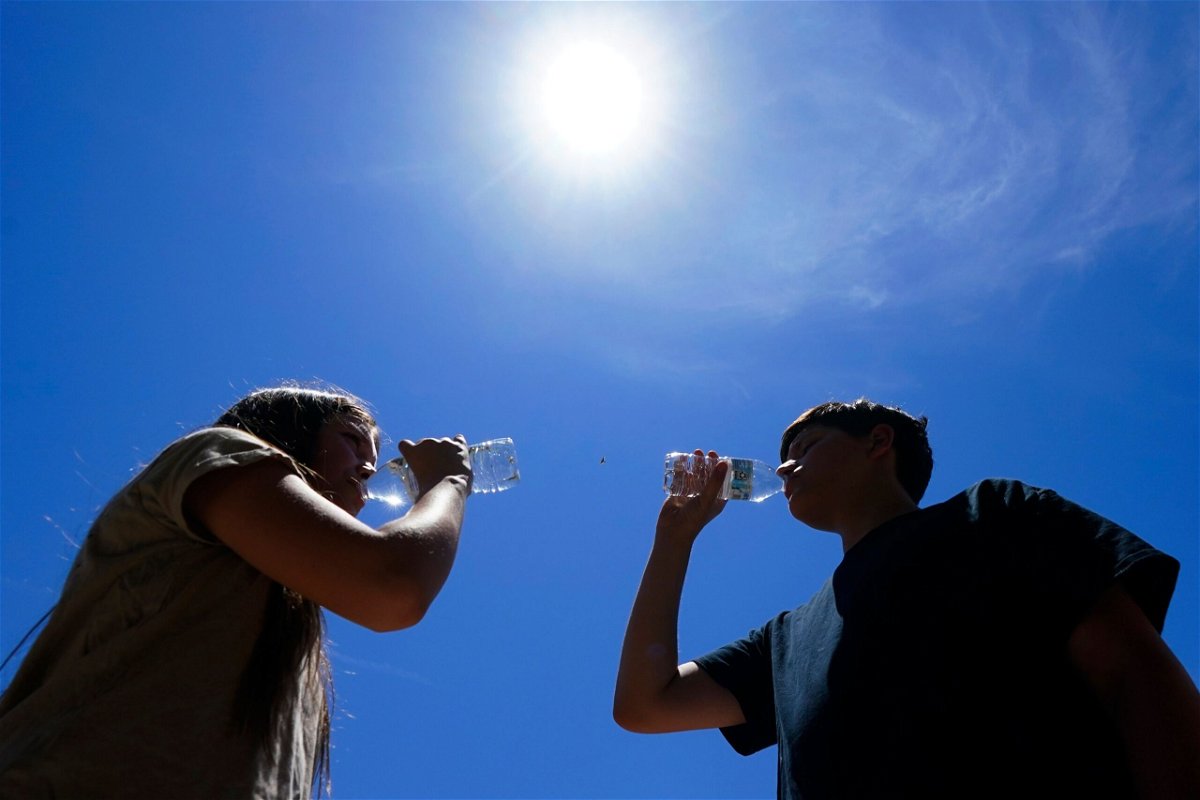Extreme heat is the deadliest natural disaster. FEMA can’t treat it like one

Extreme heat is far deadlier than other natural disasters
By Ella Nilsen, CNN
(CNN) — Extreme heat is far deadlier than other natural disasters, killing on average more than twice as many people each year as hurricanes and tornadoes combined, according to data tracked by the National Weather Service.
Despite this, heat isn’t on the list of disasters eligible for assistance from the Federal Emergency Management Agency because it’s nowhere in the Stafford Act – the federal law that gives FEMA the power to respond to emergencies and determines what qualifies as one.
As President Joe Biden travels West this week to celebrate the Inflation Reduction Act, Democrats’ landmark climate law, and tout his climate agenda, temperatures in the Southwest are still topping out above 100 degrees. Phoenix clocked its 44th consecutive day over 105 degrees on Monday, and the extreme heat has wilted the Southwest’s iconic saguaro cactuses and given third-degree burns to people who fell on the sidewalk.
Phoenix Mayor Kate Gallego recently told Biden the city’s extreme heat is a “long-term emergency.” But it can’t get FEMA federal assistance unless Congress amends the Stafford Act – something some Western lawmakers are pushing for.
“We essentially just don’t have the governance structures in place to deal with heat” in the same way we deal with wildfires and hurricanes, University of Arizona professor and heat response expert Ladd Keith told CNN. “Heat is literally the fingerprint of climate change, but it’s the last part of climate we’ve begun to address at the national, state and local level.”
FEMA isn’t ignoring extreme heat; the agency has programs to raise heat awareness and has emergency preparedness funding that can go towards helping mitigate heat. FEMA Administrator Deanne Criswell recently told the Washington Post that the agency has a role to play in giving communities funding to set up new cooling centers or ensure power infrastructure won’t fail during high temperatures.
“Just because we don’t necessarily have the authorities right now in the Stafford Act, that doesn’t mean we’re sitting idly by,” Criswell said.
But the agency’s full power and resources that are set in motion when presidents declare disasters don’t apply during a heatwave – no matter how long it lasts.
“Right now, FEMA doesn’t treat extreme heat in the same way as it does other disasters because it can’t,” Juanita Constible, senior climate and health advocate for the Natural Resources Defense Council, told CNN.
Gallego told CNN on Tuesday that adding heat to the Stafford Act would enable Phoenix and other communities to unlock far more federal resources to help cool people and protect the electric grid when extreme heat refuses to quit. For instance, it could enable the federal government to bring in more mobile cooling units, she said.
“We only have so many of them and if the fed government had a critical mass of those units they could bring them wherever they are and really help communities,” Gallego said. “We know that climate change is a reality for the entire country. We’ve seen communities from Chicago to the Pacific Northwest lose hundreds of people during heatwaves.”
There is currently a bipartisan bill – led by Democratic Rep. Ruben Gallego of Arizona – to add extreme heat to the Stafford Act. But the legislation hasn’t gotten far in Congress.
Rep. Gallego said in a statement he had spoken to Biden during the president’s visit to Arizona on Monday night “about the need for FEMA to declare extreme heat a disaster.”
Heat is a “largely invisible threat,” Ladd said, but Congress adding it to the Stafford Act could be a tremendous boost to state and federal efforts to combat its effects. For instance, if power goes out in a community that is sweltering in a heatwave, federal officials could more easily step in to provide cooling, Ladd said.
“Adding it to that official list from Congress would clarify FEMA’s role in addressing heat,” Ladd said.
But Constible told CNN that despite FEMA’s vast federal resources, it actually might not be the best agency to respond to extreme heat. For one thing, heat is a “creeping disaster;” unlike a hurricane or tornado, it lingers, instead of rolling in and out of a place quickly. And heat takes a toll on humans more than it does on infrastructure.
“Disasters tend to be defined in terms of property damage,” Constible said. “Very expensive things get broken and that’s when a disaster gets declared. But heat is more of a health problem.”
There are already 39 confirmed heat-associated deaths so far this year in Maricopa County, where Phoenix is located – and over 300 more are under investigation – according to county data.
“We don’t have a good way of even capturing how many people are unwell in a particular heatwave,” Constible said. “I would argue the entire nation is unprepared for the temperatures we’re seeing this summer.”
To address the void, the Biden administration has announced several federal initiatives to try to deal with the heat. At a recent event where he heard from the Phoenix and San Antonio mayors, Biden announced he was asking the Department of Labor to ramp up its enforcement efforts to protect workers against the extreme heat on the job, as well as new funding to help the National Weather Service improve forecasting.
“This is the most heat focused administration in our country’s history,” Keith said, noting that even a few years ago, heat was rarely listed among serious climate impacts. “Having said that, there’s still a very long way to go. It’s a very urgent issue, we need to create those government structures quickly.”
The-CNN-Wire
™ & © 2023 Cable News Network, Inc., a Warner Bros. Discovery Company. All rights reserved.

